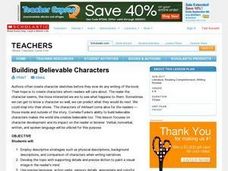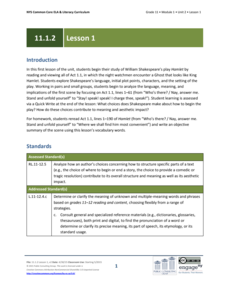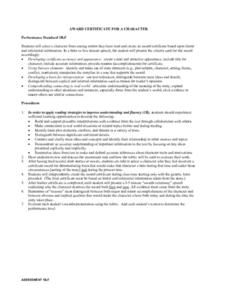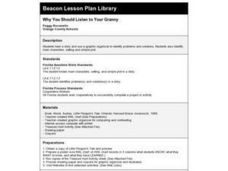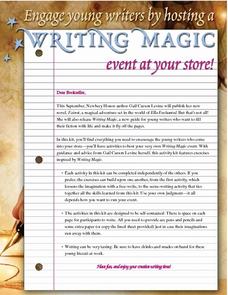Curated OER
Identifying Story Elements
Help your class identify story elements. They will discuss character, setting, problem, and solution after reading a story. A graphic organizer will help them to identify various elements with guided practice and independent practice...
Curated OER
Just the Facts, Ma'am
Elementary learners identify the main elements of story structure and form questions to summarize their reading. They listen as the teacher reads a story and then write questions to determine (1) main characters, (2) setting, (3)...
Curated OER
Story Pyramids
Young writers generate descriptive words. They use pictures of various landscapes (from books, magazines, or the Internet) and complete a story pyramid. The pyramid (included here) asks to describe the main character, the setting, and...
Curated OER
Deck the Halls with Literature Trees
Reinforce and assess reading comprehension by having your class make a literature tree! After reading a book, pupils make decorations to represent the book's themes, characters, and setting. Materials for decorating can be as diverse and...
Curated OER
Visualization: Cricket in Times Square
After reading The Cricket in Times Square chapter titled "Caught in the Kitchen," learners list three describing details about the characters and setting. Groups collaborate to find sensory details to support their character assertions....
Illustrative Mathematics
Grandfather Tang's Story
It's amazing the complex figures that can be made using only a few simple shapes. Following a class reading of the children's book Grandfather Tang's Story by Ann Tompert, young mathematicians use sets of tangrams to create models...
Creative Competitions, Inc.
Odyssey of the Mind Curriculum Activity: Fantastic Fairy Tale
Learning about literature can be so much fun; it can also be made more accessible through projects and dramatic play. As they explore theme, character, and setting, the class gets creative and makes a dramatic recreation of a classic...
Curated OER
CREATING A CHARACTER TRAIT MOBILE FROM THE OPERA THE LITTLE PRINCE
Students create a mobile that includes each of the six planets. They list the character traits of each of the characters from the six planets visited by the Prince. They present their project to the class and teacher.
Curated OER
Character Analysis and The Crucible
Readers of The Crucible use a SATDO chart to collect evidence they will use to craft interpretive statements and an analysis of one of Miller’s characters. Background information on the play and about Miller, links to handouts,...
Curated OER
Design a Book Cover
Students use the programs Pics4Learning and ImageBlender 3 to apply their knowledge of characters, plot, setting, symbolism, and conflict to design and create a book cover. Designed as a culminating literature activity.
Curated OER
Story Elements
Third graders identify story elements. In this story elements lesson, 3rd graders look at main idea, characters, point of view, theme and setting. They create a five paneled comic strip from a book.
Curated OER
Number the Stars, Lesson 3
Students consider how an author creates a feeling of suspense in a reader's mind. They analyze characters in the story. Students make a character map for Peter. They discuss how suspense unfolds in the novel Number the Stars.
Curated OER
Building Believable Characters
Learners use descriptive strategies such as physical descriptions, background, and comparison of characters when writing narratives. They develop the topic with supporting details and precise diction to paint a visual image in the...
Curated OER
Palace Adventure
Young language arts learners write and illustrate a short fantasy story based on the book Corduroy. First, learners need to develop a character. Then, through their writing and illustrations, they take their characters on adventures...
EngageNY
Grade 11 ELA Module 1: Unit 2, Lesson 1
How can an author's decisions impact a text? Using an insightful resource, scholars begin their study of Hamlet by reading Act 1.1. They explore the language, characters, and setting in small groups. Upon finishing group work, pupils...
Curated OER
Creating a Cartoon
In this journalism worksheet, students learn the guidelines for creating a political or editorial cartoon. Students complete 5 questions which help them plan the purpose, characters and setting for the cartoon. Students then draw the...
Curated OER
AWARD CERTIFICATE FOR A CHARACTER
Connect to real-world experiences by having your primary learners create an award certificate based upon literal and inferential information from a story. They present the award to a character from a story and explain the criteria used....
Curated OER
Tall Tales and Urban Legends
In this creative writing worksheet, students sort through old pictures and discuss the characterization in each. Students create characters, a setting, and their own tall tale or urban legend based on the pictures.
Curated OER
WHY YOU SHOULD LISTEN TO YOUR GRANNY
Students hear a story and use a graphic organizer to identify problems and solutions. They also identify main characters, setting and simple plot. They illustrate one situation when they should listen to their parents.
Curated OER
Read Aloud- Literary Elements- Prediction
First graders read two stories. In this literary elements lesson, 1st graders read The Hat by Jan Brett, notice patterns of prediction, identify the setting, problem and solution and compare the story to the book The Mitten.
Curated OER
It's in the Elements - Lesson Four
Students compare and contrast story elements in two versions of Cinderella. In this literature elements lesson, students are read two different versions of Cinderella, they identify the characters, plot, and setting, then they...
Curated OER
What If: The Seed Of A Story
Students read and comprehend a piece of fictional writing, analyze how setting, characterization, and plot affect the theme of a story and work in a group to create a new writing assignment. This 5-day plan culminates in students writing...
Curated OER
Writing Magic
Students write a story. In this writing lesson plan, students are given a series of prompts to promote them in writing a story. The prompts include writing a free write, writing about characters, writing about a setting, writing about...
Orange County Department of Education
Black Cowboy, Wild Horses
Fifth graders read the selection Black Cowboy, Wild Horses and identify characteristics of self-discipline shown by story's main character, Bob Lemmons. Students then identify some of their own traits of self-discipline and reflect upon...












